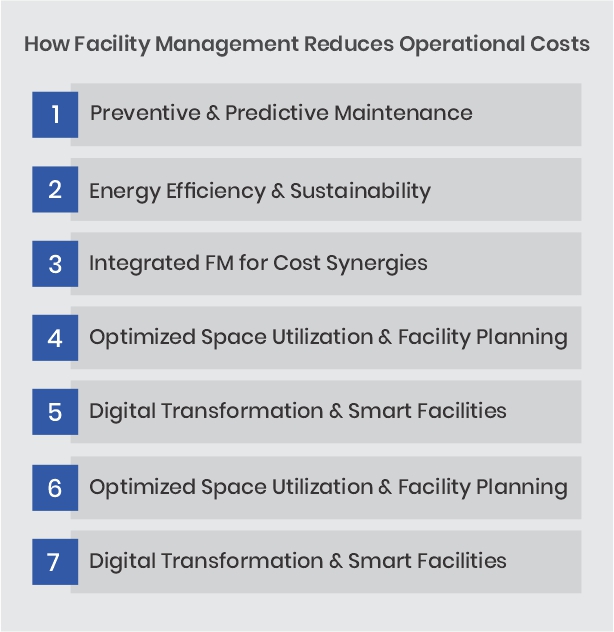Effective Facility Management in India is a key driver for reducing operational costs while enhancing productivity and sustainability. From Facility Planning India and facility services management to Integrated Facility Management India, businesses benefit through preventive maintenance, energy efficiency, digital transformation, and optimized space utilization. Professional Facility Management Companies India deliver cost savings, compliance, and improved employee well-being. By outsourcing non-core functions and adopting innovative solutions like Facade Cleaning India and Facility Maintenance India, organizations unlock long-term efficiency and value.
Reducing Operational Costs Through Effective Facility Management in India
In today’s highly competitive business environment, organizations across India are constantly striving to reduce operational costs while maintaining efficiency, productivity, and sustainability. One of the most effective strategies to achieve this balance is facility management. By ensuring that buildings, equipment, and support services are managed efficiently, businesses can optimize resources, cut down wastage, and achieve significant cost savings.
Facility Management Companies in India are playing a crucial role in this transformation by offering comprehensive solutions that streamline operations, enhance productivity, and ultimately, reduce costs. Whether it is through Facility Planning in India, facility services management, or adopting Integrated Facility Management in India, organizations can unlock long-term value and operational efficiency.
Understanding Facility Management in the Indian Context
Facility Management in India has evolved over the last decade from being limited to housekeeping or maintenance services into a fully integrated system that combines technology, sustainability, and operational excellence. The scope of Facilities Management in India now spans:
- Facility Maintenance (preventive and corrective)
- Housekeeping and hygiene services
- Facade Cleaning India and other specialized services
- Energy and utilities management
- Space optimization and facility planning
- Vendor and compliance management
- Security, catering, horticulture, and more
As Indian industries-from manufacturing to IT parks, healthcare to education-grow in size and complexity, the demand for cost-effective and scalable facility solutions has increased substantially.
How Facility Management Reduces Operational Costs

1. Preventive & Predictive Maintenance
Unplanned equipment failures often result in high repair costs and production downtime. With structured Facility Maintenance practices, organizations adopt preventive and predictive maintenance strategies. For example:
- HVAC systems maintained regularly reduce energy wastage.
- Predictive analytics ensures machinery is serviced before breakdowns.
- Long equipment life reduces capital expenditure.
By lowering unexpected repair costs, businesses can save up to 20–30% annually on maintenance expenses.
2. Energy Efficiency & Sustainability
Energy accounts for one of the largest operational costs in commercial and industrial facilities. Through facility services management, companies can:
- Install energy-efficient lighting (LED, motion-sensor lights).
- Optimize HVAC usage through automated systems.
- Implement renewable energy solutions such as solar panels.
- Monitor real-time energy usage with smart meters.
Such measures not only lower utility bills but also align with global ESG goals, helping companies achieve sustainability targets.
3. Integrated Facility Management for Cost Synergies
Instead of dealing with multiple vendors for different services, many businesses are now turning to Integrated Facility Management India (IFM) providers. IFM brings together all services—housekeeping, catering, technical maintenance, pest control, Facade Cleaning India, landscaping, and more—under a single umbrella.
This integration reduces overheads by:
- Eliminating duplication of resources
- Negotiating better vendor rates
- Improving accountability and reporting
- Enhancing coordination and communication
According to industry reports, organizations that adopt IFM save up to 15–20% on their annual operational budgets.
4. Optimized Space Utilization & Facility Planning
Office spaces, warehouses, and manufacturing plants often have underutilized areas, which leads to unnecessary rental and maintenance costs. Facility Planning in India helps in:
- Designing workspaces that accommodate more employees without increasing floor space.
- Creating flexible layouts to support hybrid work models.
- Introducing hot-desking and shared utilities.
With real estate costs in metro cities like Mumbai, Bengaluru, and Delhi among the highest in Asia, space optimization becomes a critical cost-saving strategy.
5. Digital Transformation & Smart Facilities
The integration of technology in facility services management is revolutionizing cost efficiency. Modern Facility Management Companies India use:
- IoT-enabled sensors for energy and water monitoring
- AI-driven maintenance alerts
- Computer-aided Facility Management (CAFM) software for tracking assets
- Mobile apps for real-time reporting and complaint redressal
These innovations not only enhance productivity but also minimize manpower dependency and resource wastage.
6. Outsourcing to Professional Facility Management Companies
By outsourcing non-core activities like cleaning, catering, landscaping, and technical maintenance, businesses can focus on their core operations while reducing payroll and training costs. Professional Facilities Management India companies bring:
- Skilled manpower and training expertise
- Standardized processes compliant with global norms
- Bulk procurement advantages that reduce supply chain costs
Outsourcing also reduces risks related to compliance, safety, and labor laws.
7. Enhanced Health, Hygiene & Employee Productivity
A clean and well-maintained facility directly impacts employee morale and efficiency. Services like Facade Cleaning India, pest control, and indoor air quality management improve workplace hygiene. In return:
- Reduced absenteeism due to health issues
- Increased employee engagement and output
- Better retention rates, lowering recruitment and training costs
A study revealed that well-managed facilities improve employee productivity by up to 12–15%, indirectly reducing costs per unit of output.
Real-World Applications in Indian Industries
Manufacturing & Heavy Industry: Factories across Maharashtra, Gujarat, and Tamil Nadu rely heavily on Facility Maintenance India to ensure machines operate efficiently. Preventive maintenance in automotive and pharmaceutical industries helps reduce downtime and improve output quality.
IT & Corporate Parks: Bengaluru, Hyderabad, and Pune IT hubs utilize Integrated Facility Management to streamline large campuses. From security to catering, and from facade cleaning to landscaping, IFM ensures cost predictability and transparency.
Healthcare Sector: Hospitals demand high hygiene standards. Outsourcing to professional Facility Management Companies in India ensures compliance with NABH standards, reducing operational risks while keeping costs under control.
Retail & Commercial Real Estate: Shopping malls and commercial towers benefit from Facility Planning in India, optimizing common spaces, ensuring 24/7 maintenance, and reducing energy costs through centralized monitoring systems.
Challenges in Implementing Cost-Effective Facility Management
While the benefits are significant, Indian organizations face some hurdles:
- Low awareness of modern facility management solutions among small businesses.
- Resistance to outsourcing due to fear of losing control.
- Cost-cutting mindset some firms view FM as an expense rather than a cost-saving investment.
- Fragmented vendor ecosystem, making standardization difficult.
- Compliance and safety regulations requiring continuous training and monitoring.
The Future of Facility Management in India
The demand for Facilities Management India is projected to grow at a CAGR of over 20% in the next five years. Key trends include:
- Green Buildings & ESG Integration: Facility planning will focus on energy conservation, water recycling, and waste management.
- Automation & AI: Robotics in cleaning, drone-based facade inspections, and AI-based predictive analytics will reduce manpower reliance.
- Workplace Flexibility: Post-COVID, hybrid work models will require adaptive facility solutions.
- Comprehensive Outsourcing: More organizations will adopt Integrated Facility Management to reduce costs and ensure accountability.
Conclusion
Reducing operational costs is not just about cutting expenses but about optimizing efficiency and sustainability. By leveraging Facility Management India, organizations can unlock hidden savings in maintenance, energy, space utilization, and manpower deployment.
Whether it’s through Facility Planning, facility services management, or adopting Integrated Facility Management, the results are clear—better cost control, improved employee productivity, and enhanced organizational resilience.
As industries grow and infrastructure expands, Facility Management Companies in India will continue to play a pivotal role in shaping cost-effective, sustainable, and future-ready workplaces.
Investing in effective Facilities Management India today is not just about saving costs—it is about building long-term value, ensuring compliance, and creating workplaces that foster growth, safety, and innovation.
Industries we serve:
Automobile | Ancillary | Manufacturing | Pharmaceutical | Healthcare | Oil and Gas | FMCG | Education | Real Estate | Commercial
Also read: The Role of FM in Enhancing Workplace Productivity in India

